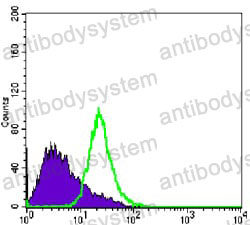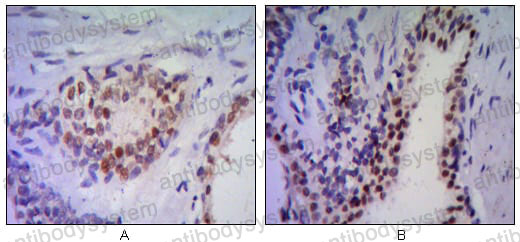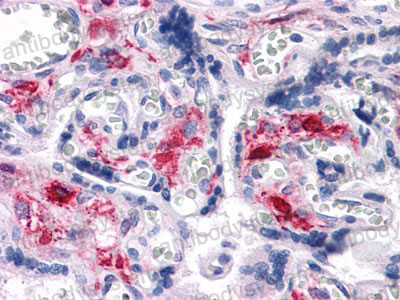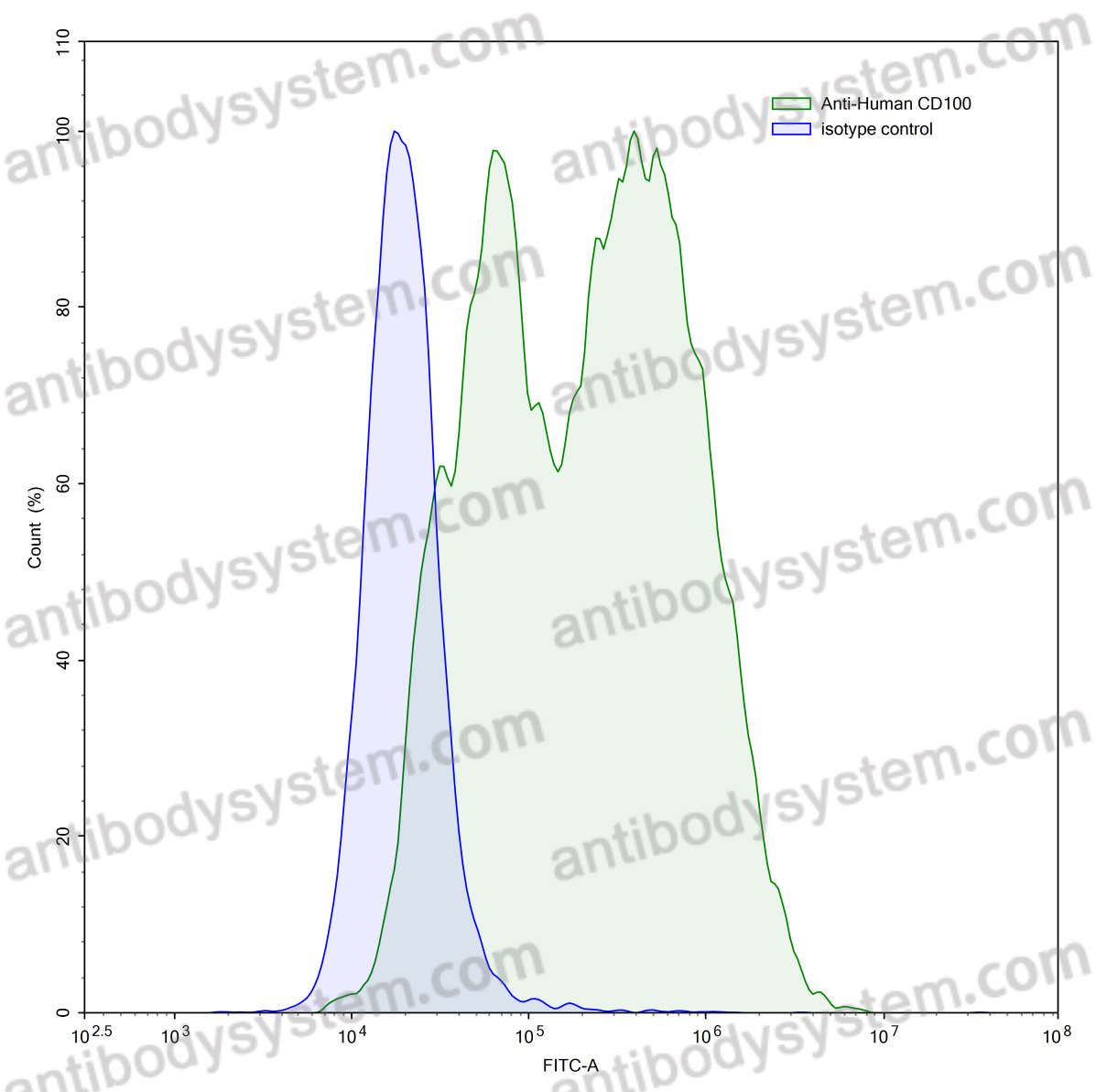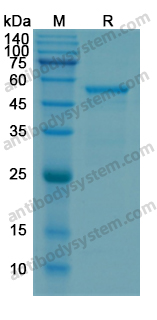Catalog No.
RHN91601
Species reactivity
Human
Host species
Mouse
Isotype
IgG2b
Clonality
Monoclonal
Tested applications
FCM: 1:200-1:400, IHC: 1:200-1:1000, WB: 1:500-1:2000
Target
Homeobox protein Nkx-3.1, NKX3.1, Homeobox protein NK-3 homolog A, NKX3-1, NKX3A
Concentration
1 mg/ml
Endotoxin level
Please contact with the lab for this information.
Purity
>95% as determined by SDS-PAGE.
Purification
Protein A/G purified from cell culture supernatant.
Accession
Q99801
Applications
FCM, IHC, WB
Form
Liquid
Storage buffer
0.01M PBS, pH 7.4, 0.05% Sodium Azide.
Stability and Storage
Use a manual defrost freezer and avoid repeated freeze-thaw cycles. Store at 4°C short term (1-2 weeks). Store at -20°C 12 months. Store at -80°C long term.
Clone ID
R4A82
Accelerating histopathology workflows with generative AI-based virtually multiplexed tumour profiling., PMID:39309216
Characterization of HOXB13 expression patterns in localized and metastatic castration-resistant prostate cancer., PMID:37850574
Immunohistochemical Characterization of a Large Cohort of Triple Negative Breast Cancer., PMID:37306115
[Expression and diagnostic value of NKX3.1 and NKX2.2 in mesenchymal chondrosarcoma]., PMID:35152629
[Extraskeletal mesenchymal chondrosarcoma in central nerve system: a clinicopathological analysis]., PMID:34619870
Metastatic Carcinoma of Prostate as a Mimicker of SAPHO Syndrome., PMID:33985979
Diagnostic Immunohistochemistry of Soft Tissue and Bone Tumors: An Update on Biomarkers That Correlate with Molecular Alterations., PMID:33921435
Confirmation of NKX3-1 Expression in EWSR1-NFATC2 Sarcoma and Mesenchymal Chondrosarcoma Using Monoclonal Antibody Immunohistochemistry, RT-PCR, and RNA In Situ Hybridization., PMID:33443863
Tumor Suppressive Maspin-Sensitized Prostate Cancer to Drug Treatment Through Negative Regulating Androgen Receptor Expression., PMID:33195208
Utility of NKX3.1 immunohistochemistry in the differential diagnosis of seminal vesicles versus prostatic tissue in needle biopsy., PMID:33126153
NKX3.1 immunoreactivity is not identified in mesenchymal chondrosarcoma: a 25-case cohort study., PMID:32779239
Large-scale genome-wide association study in a Japanese population identifies novel susceptibility loci across different diseases., PMID:32514122
Immunohistochemical Reactivity of Prostate-Specific Markers for Salivary Duct Carcinoma., PMID:31865345
The Homeodomain Transcription Factor NKX3.1 Modulates Bladder Outlet Obstruction Induced Fibrosis in Mice., PMID:31781523
NKX3.1 and Prostein Expression in Testicular Tissue and Sex Cord-stromal Tumors., PMID:31498176
Adenocarcinoma of the Rete Testis: Clinicopathologic and Immunohistochemical Characterization of 6 Cases and Review of the Literature., PMID:30676333
Prostate Cancer Disseminated Tumor Cells are Rarely Detected in the Bone Marrow of Patients with Localized Disease Undergoing Radical Prostatectomy across Multiple Rare Cell Detection Platforms., PMID:29339080
Vasitis nodosa and related lesions: a modern immunohistochemical staining profile with special emphasis on novel diagnostic dilemmas., PMID:29241741
Performance of different prostate specific antibodies in the cytological diagnosis of metastatic prostate adenocarcinoma., PMID:28888085
A Polyclonal Antibody to NKX3.1 Identifies Fungal Organisms From the Esophagus., PMID:28777145
Ornithine Decarboxylase Activity Is Required for Prostatic Budding in the Developing Mouse Prostate., PMID:26426536
Detecting metastatic prostate carcinoma in pelvic lymph nodes following neoadjuvant hormone therapy: the eyes have it!, PMID:26018610
Metastatic carcinoma of unknown primary: diagnostic approach using immunohistochemistry., PMID:25844674
Prostate adenocarcinomas aberrantly expressing p63 are molecularly distinct from usual-type prostatic adenocarcinomas., PMID:25216229
Best practices recommendations in the application of immunohistochemistry in the prostate: report from the International Society of Urologic Pathology consensus conference., PMID:25029122
Essential roles of epithelial bone morphogenetic protein signaling during prostatic development., PMID:24731097
Alterations of C-MYC, NKX3.1, and E-cadherin expression in canine prostate carcinogenesis., PMID:24030851
4FISH-IF, a four-color dual-gene FISH combined with p63 immunofluorescence to evaluate NKX3.1 and MYC status in prostate cancer., PMID:23640976
Phosphorylation of the androgen receptor by PIM1 in hormone refractory prostate cancer., PMID:22986532
Inflammation-mediated abrogation of androgen signaling: an in vitro model of prostate cell inflammation., PMID:22911881
Tuberous sclerosis complex 1: an epithelial tumor suppressor essential to prevent spontaneous prostate cancer in aged mice., PMID:20940396
Effect of Ack1 tyrosine kinase inhibitor on ligand-independent androgen receptor activity., PMID:20623637
NKX3.1 as a marker of prostatic origin in metastatic tumors., PMID:20588175
Specific detection of prostate cancer cells in urine by multiplex immunofluorescence cytology., PMID:19368959
Stromal transforming growth factor-beta signaling mediates prostatic response to androgen ablation by paracrine Wnt activity., PMID:18559517
Evidence that phosphorylation of the RNA polymerase II carboxyl-terminal repeats is similar in yeast and humans., PMID:16012166
Structural and functional analysis of domains mediating interaction between NKX-3.1 and PDEF., PMID:15523673
A telomerase-immortalized primary human prostate cancer clonal cell line with neoplastic phenotypes., PMID:15375556
Analysis of androgen regulated homeobox gene NKX3.1 during prostate carcinogenesis., PMID:15311057
Expression, specificity and immunotherapy potential of prostate-associated genes in murine cell lines., PMID:11760786
Loss of NKX3.1 expression in human prostate cancers correlates with tumor progression., PMID:11085535

